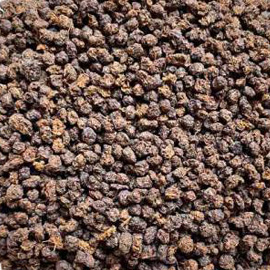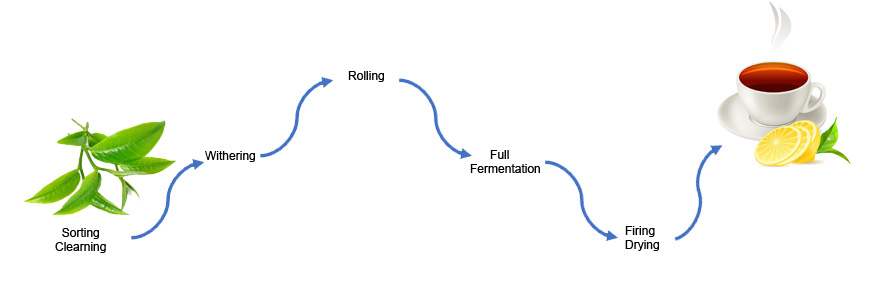Black tea is a specific type of tea, which is more oxidized than other teas like green tea, oolong tea and white teas. Black tea is generally stronger in flavor than the less oxidized teas.
Black tea is made from the leaves of the shrub Camellia sinensis. Generally, unblended black teas are named after the region in which they are produced. Often, different regions are known for producing teas with characteristic flavors.
Mentioned below are the best health benefits of Black Tea. You can add black tea with lemon, honey, which are good for headache, and constipation problem.
It's antioxidant properties boost heart health and lower blood pressure. Drink black tea to improve your gut health and immune system. We also listed out how you can use black tea for different health purposes and when not to consume black tea to avoid side effects.
1. Black tea good for oral thrush
Consumption of black tea can help protect against dental cavities, plaques and tooth decay. It can also help freshen your breath. Black tea possesses antibacterial and antioxidant properties that prevent staphylococcus infections. Moreover, the fluoride present in black tea inhibits dental carries.
2. Black tea eliminates free radicals in the body
Free oxygen radicals are produced as a result of changes in metabolism, or external influences such as smoking, pollution, etc., which leads to an overload of free radicals in the body.
Free radicals are generally very toxic for the body. Black tea contains antioxidants that help neutralize and flush out these free radicals.
3. Black tea prevents formation of kidney stones
Kidney stones are formed as a result of increased excretion of crystal forming substances such as oxalate, calcium, and uric acid in the body. Drinking black tea can significantly reduce the risk of formation of kidney stones.
4. Black tea before for bed weight loss
Obesity is one of the root causes of diseases such as heart disease and diabetes. Similar to green tea, daily consumption of black tea can also aid in weight loss, if consumed along with making necessary lifestyle changes.
Black tea helps reduce visceral fat by reducing genes that induce inflammation. Since a prolonged period of inflammation in the body can induce obesity, by drinking black tea you can prevent inflammation-induced obesity.
5. Black tea lowers cholesterol levels
High cholesterol levels are a result of an unhealthy lifestyle and bad food habits. A buildup of LDL cholesterol (bad cholesterol) can lead to plaque buildup in the arterial walls thereby limiting the blood flow, and leading to heart attack, stroke and ischemic attack.
Drinking black tea on a regular basis can help lower bad cholesterol levels. Moreover, black tea has anti-hypercholesterolemia effect in people who are obese and prone to heart disease.
6. Black tea keeps your digestive tract healthy
Black tea is very effective in keeping your digestive tract healthy, and ensuring that it functions properly. Black tea polyphenols act as a prebiotic, which helps to increase the good gut bacteria.
Plus, these polyphenols also prevent the growth of other harmful bacteria in the gut. Black tea can also help reduce stomach ulcers and colorectal, esophageal/stomach cancers.
7. Balck tea Improves bone health
The strength of bones in your body begins to decline along with age. However, studies have proved that drinking black tea daily can significantly restore bone density.
Black tea is an excellent substitute for calcium. It is for this very reason that drinking black tea regularly can help prevent the risk of fractures and osteoporosis in elderly people.
8. Balck tea boosts immune system
Black tea is rich in antioxidants which help destroy free oxygen radicals in the body. The oxygen radicals tend to mutate DNA and hamper normal cell function. This can lead to inflammation and activation of inflammatory pathways, which, in turn, can put the body in a state of stress. Black tea helps flush out the oxygen radicals thereby helping to restore normal cell and body functions and boosts immunity.
9. Black tea lowers the risk of diabetes
Diabetes is a disease that affects millions of people all over the world. This metabolic disease can be treated the most efficiently if it is checked in its early stages.
Drinking black tea has been proved to lower the risk of onset of Type 2 diabetes. The catechins and theaflavins in black tea help make the body more insulin sensitive and prevents beta cell dysfunction.
10. Black tea lowers the risk of ovarian cancer
Cancer is a fatal disease that has claimed millions of lives. Similar to the catechins present in green tea, the theaflavins present in black tea can inhibit the proliferation of ovarian cancer cells. Studies have shown that there is a steady decline in ovarian cancer risk in patients who drink 2-3 cups of black tea per day.
11. Black tea boosts heart health
The heart is one of the most vital organs, and healthy functioning of the heart is one the top priorities of the body. Black tea is rich in flavones, which help improve heart health.
Drinking around 2-3 cups of black tea per day can reduce the risk of coronary heart diseases. Additionally, black tea is also associated with reduced ischemia, myocardial infarction and cardiovascular mortality.
* Uses of Black Tea
Other than its use as a popular beverage, black tea is often used to help improve memory and mental alertness, and is also often used for treating conditions such as low blood pressure, Parkinson's disease, ovarian cancer and breast cancer. Black tea has diuretic properties, which is why it is often used to increase urine flow.
Black tea is also widely used to help prevent atherosclerosis, which is a hardening of the arteries. Research has shown that people who drink black tea seem to have a reduced risk of having their arteries becoming hardened. Drinking black tea can also help treat low blood pressure problems, as well as prevent osteoporosis.
* Side-Effects & Allergies of Black Tea
Drinking black tea in moderation can have a huge variety of health benefits. However, excessive drinking can have a negative impact on health. High amounts of black tea can cause side effects due to the caffeine in black tea.
These side effects can range from mild to serious and include headache, nervousness, sleep problems, vomiting, diarrhea, irritability, irregular heartbeat, tremor, heartburn, dizziness, ringing in the ears, convulsions, and confusion.
The high content of caffeine in black tea can often cause excitability and nervousness, as a result of which black tea should always be drunk in moderate doses.
*Cultivation of Black Tea
Black tea has its origins in China, where it is called 'red tea'. Today, the vast majority of black tea consumed in the West is from India. Unlike in China where all tea comes from the Camellia sinensis plant species, Indian tea is made from the native Camellia assamica species which has a higher yield, a stronger flavor and much higher levels of caffeine.
Modern favorites like Darjeeling, Earl Gray and Orange Pekoe were developed by early British growers in India trying to inexpensively reproduce their favorite beverage from China.
The tea plant can handle a light frost and even snow, but not heavy freezes or prolonged cold winters. It can thus grow from subtropical climates to tropical climates, but generally requires a fair amount of humidity and rainfall during the growing season. Although it can grow in hot tropical climates if they are sufficiently humid, the highest-quality teas mostly come from subtropical climates.

